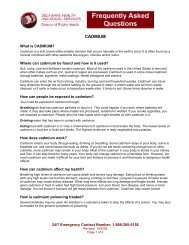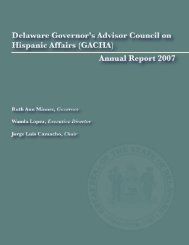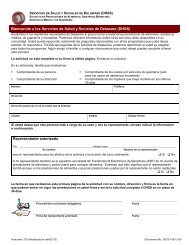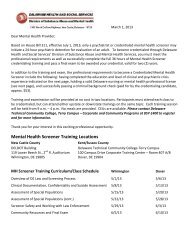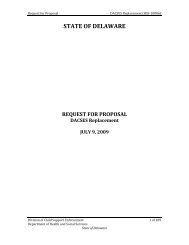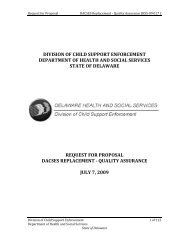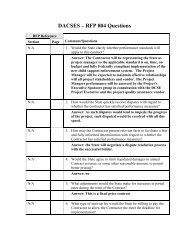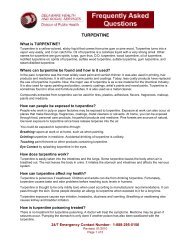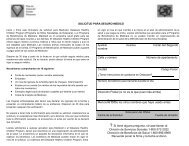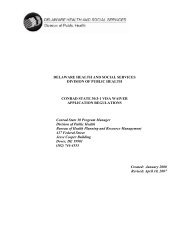Compassion Fatigue, Vicarious Trauma & Self Care - Delaware ...
Compassion Fatigue, Vicarious Trauma & Self Care - Delaware ...
Compassion Fatigue, Vicarious Trauma & Self Care - Delaware ...
You also want an ePaper? Increase the reach of your titles
YUMPU automatically turns print PDFs into web optimized ePapers that Google loves.
<strong>Vicarious</strong> <strong>Trauma</strong> & <strong>Self</strong> <strong>Care</strong><br />
Dr. Judith E. Pierson<br />
Psychologist<br />
Rehoboth Beach
That which makes us good at and<br />
committed to this work<br />
Is also that which makes it<br />
challenging.
We do this because we care,<br />
because we are naturally empathic,<br />
and because many of us have<br />
experienced trauma ourselves.
Many titles, similar concept<br />
• Burnout<br />
• <strong>Compassion</strong> <strong>Fatigue</strong><br />
• Secondary <strong>Trauma</strong>tic Stress<br />
• <strong>Vicarious</strong> <strong>Trauma</strong>
What is the emotional price of<br />
caring ?<br />
• The stress scores of palliative care<br />
workers are almost twice as high as<br />
those of newly widowed women and<br />
higher than patients newly diagnosed<br />
with breast cancer.<br />
(Vachon Vachon, , 1987)<br />
1987
In studies of social workers:<br />
• 39% reported current symptoms of<br />
burnout and<br />
• 75% reported experiencing burnout at<br />
some point in their career. (Brown, 2008)<br />
• 73% of social workers have considered<br />
leaving their jobs (Maslach Maslach, , 2003)
• Social workers have higher rates of<br />
burnout than other helping<br />
professionals such as occupational<br />
therapists (Brown, 2008)<br />
• In a study of British social workers<br />
74% were experiencing high levels of<br />
anxiety (Lloyd et al., 2002)<br />
• 62% of experience Child Protective<br />
Service workers scored high on a<br />
measure of emotional exhaustion.<br />
(Anderson, 2001)
In a study of substance abuse<br />
workers<br />
• 82% reported high psychological<br />
stress<br />
• 33% were experiencing emotional<br />
exhaustion<br />
• 36% reported diminished feelings of<br />
personal accomplishment (Oyefeso<br />
2008)<br />
Oyefeso et al.,
We can be as traumatized as<br />
our clients<br />
In one study<br />
17.7% of caseworkers suffered from<br />
secondary traumatic stress, while only<br />
15.2% of Vietnam Vets reported post- post<br />
traumatic stress disorder (Kulka<br />
Kulka et al, 1990)
<strong>Vicarious</strong> <strong>Trauma</strong><br />
“<strong>Vicarious</strong> <strong>Vicarious</strong> traumatization is the process<br />
through which the therapist’s therapist s inner<br />
experience is negatively transformed<br />
through empathic engagement with the<br />
client’s client s trauma material.” material.<br />
(McCann & Pearlman, 1990)
Signs of <strong>Compassion</strong> <strong>Fatigue</strong> &<br />
<strong>Vicarious</strong> <strong>Trauma</strong><br />
• Hypervigilance<br />
• Suspicion about people’s people s motives & behaviors<br />
• Difficulty sleeping, nightmares<br />
• Intrusive images<br />
• Anxiety<br />
• Numbness<br />
• Inability to experience pleasure
• Excessive caregiving (on & off the job)<br />
• Cynicism<br />
• Feelings of shame about no longer feeling<br />
like the warm, compassionate & optimistic<br />
person caregiver once was<br />
• Reactivation of own issues<br />
• Anger & irritability often due to fatigue
• Reduced tolerance for what are<br />
perceived as others’ others “petty petty problems” problems<br />
• Depression<br />
• Exhaustion<br />
• Increased self-criticism<br />
self criticism<br />
• Feel estranged from others
• Challenges to one’s one s cognitive schema’s schema s<br />
(how one makes sense of the world)<br />
• Shatters ability to believe the world is a<br />
safe, just, controllable, and meaningful<br />
place<br />
• Carry the burden of the “terrible terrible<br />
knowledge” knowledge about the underbelly of life<br />
• Forces examination of life priorities (can<br />
be good but disruptive)
The Cost of Caring<br />
Questionnaire<br />
Check-off Check off List
What contributes to <strong>Vicarious</strong><br />
<strong>Trauma</strong>?<br />
• Bearing witness to trauma (ex. Death of a<br />
child or a young parent, or death due to<br />
traumatic event)<br />
• Powerlessness of the patient parallels<br />
caregiver’s caregiver s powerlessness if they feel they<br />
need to “fix fix it” it<br />
• Childhood experience of parentification<br />
creates unrealistic expectations in<br />
caregiver
• Believing self-care self care is less<br />
important than the care we<br />
provide others<br />
• A recognition that trauma is<br />
linked to a larger social/political<br />
power imbalances which are not<br />
easily remedied.
What contributes to burnout<br />
• Working conditions (big caseloads, do<br />
more with less, excessive paperwork, low<br />
pay, excluded from administrative<br />
decisions, etc.)<br />
• Patient contributions (multiple problems,<br />
economic limitations, hostile transference,<br />
suicide threats, fewer program options)<br />
• Isolation (physical & psychic)
The Cost of Caring<br />
Questionnaire<br />
Questions 2 & 3
Addressing <strong>Compassion</strong> <strong>Fatigue</strong> &<br />
<strong>Vicarious</strong> <strong>Trauma</strong><br />
• Must reduce stress and transform<br />
despair that comes with having one’s one s<br />
view of the world shattered<br />
• Normalize, don’t don t pathologize.<br />
pathologize.<br />
Figley<br />
(95) suggests the best counselors are<br />
most at risk because they care.
The ABC’s ABC s Of Addressing <strong>Vicarious</strong><br />
<strong>Trauma</strong>:<br />
• Awareness (of own needs, limits, emotions<br />
& resources)<br />
• Balance (of work & play; taking care of<br />
others & taking care of yourself)<br />
• Connection (to oneself, others & to<br />
something larger)
•Develop Develop cognitive<br />
schema’s schema s which<br />
recognize the miraculous<br />
standing next to the<br />
tragic
Human compassion is<br />
equal to human cruelty<br />
and …. .<br />
It is up to each of us to<br />
tip the balance.<br />
Alice Walker
• Ask for help when you need it<br />
• Create an organizational climate that<br />
encourages self-care self care<br />
• Make self-care self care a routine, not an<br />
infrequent occurrence
The Cost of Caring<br />
Questionnaire<br />
Final check off list
Strategies for Refueling<br />
• Psychologically<br />
<br />
<br />
<br />
<br />
Journal writing<br />
Sharing your feelings<br />
Vent emotions in safe ways (throwing ice<br />
cubes, play sad music)<br />
Visualize a safe & nurturing place and visit it<br />
regularly
Safe Place<br />
Visualization
Use affirmations to counter negative<br />
thinking:<br />
I may not be perfect, but I’m I m perfectly<br />
fine<br />
My needs and feelings count too.<br />
I will treat myself as kindly as I treat<br />
others<br />
I will respond to myself with<br />
compassion
Circle of Caring<br />
Exercise
Refueling<br />
• Physically<br />
<br />
<br />
<br />
<br />
<br />
<br />
Massage (simple or full body)<br />
Ask for comforting touch<br />
“Non Non-should should” exercise (walking, playing)<br />
Create healing/sacred space in your office &<br />
at home<br />
Practice radical self-care self care<br />
Create simple pleasures
Refueling<br />
• Socially<br />
<br />
<br />
<br />
<br />
Make time for pleasing social activities<br />
Get out and try new things<br />
Ask a friend to “just just listen” listen for 15<br />
minutes<br />
Gather with “kindred kindred spirit” spirit (church,<br />
support groups, clubs & other<br />
organizations)
• Connect, Connect, Connect<br />
• Get involved with social activism &<br />
community organizing<br />
• Join a support group<br />
• See if others at work would like to<br />
start a self-care self care support group
Refueling<br />
• Spiritually<br />
<br />
<br />
<br />
In response to the 3 C’s C s (I didn’t didn t cause<br />
it, I can’t can t change it, and I can’t can t control<br />
it), try the 3 P’s P s (Pause, Pray and<br />
Proceed<br />
Attend church or engage in a spiritual<br />
practice that is meaningful to you<br />
Create rituals that speak to you
Walk in nature<br />
Do whatever brings you closer to<br />
something bigger than yourself<br />
Read inspirational materials<br />
Put inspirational quotes, pictures or<br />
images around you
Develop a self-care self care<br />
Plan for Yourself<br />
Exercise
Other things that help<br />
• Develop realistic expectations for self &<br />
employees<br />
• If possible set aside some time in staff<br />
meetings to allow people to share their<br />
feelings<br />
• Don’t Don t expect quick fixes
• Share coping strategies<br />
• Confirm the positive experiences<br />
and ways in which is work<br />
enriches your life
“So So how do you sit with a shattered soul<br />
Gently, with gracious and deep respect.<br />
Patiently, for time stands still for the<br />
shattered, and the momentum of healing<br />
will be slow at first. With the tender<br />
strength that comes from an openness to<br />
your own deepest wounding, and to your<br />
own deepest healing. Firmly, never<br />
wavering in the utmost conviction that evil<br />
is powerful, but there is a good that is<br />
more powerful still.
Stay connected to the goodness with all of<br />
your being….Give being .Give freely. Take in<br />
abundantly. Find your safety, your<br />
refuge, and go there as you need. Hear<br />
what you can, and be honest about the<br />
rest; be honest at all cost. Words won’t won t<br />
always come; sometimes there are no<br />
words in the face of such tragic evil. But<br />
in your willingness to be with them, they<br />
will hear you; from soul to soul they will<br />
hear that for which there are no words.<br />
(Steele, 1989)
Crystal Exercise<br />
Sharing our suggestions<br />
and intentions.
Always remember:<br />
If your compassion does<br />
not include yourself, it is<br />
incomplete.<br />
- The Buddha



